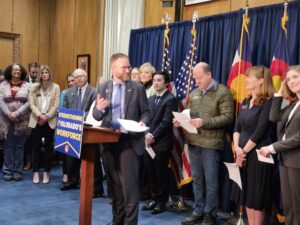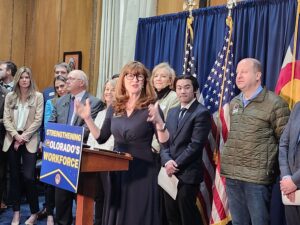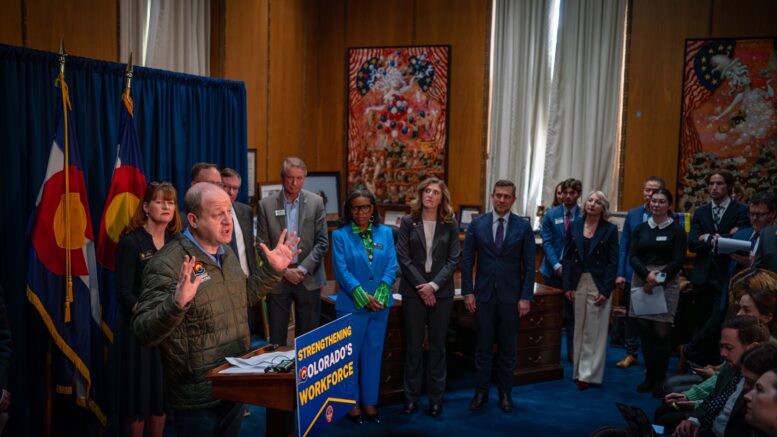Following through on a commitment he’s touted for months to put significant new resources into improving Colorado’s workforce-development system, Gov. Jared Polis and a bipartisan group of legislators rolled out an extensive package to do just that Thursday.
The highlights of the morning unveiling were a newly introduced bill to create a longitudinal data system to compare degree outcomes and another measure to increase Opportunity Now grant funding while creating new regional talent-development plans. Polis also said a bill is coming to boost tax credits and grants for companies offering apprenticeships, and those three bills sync directly with the top three recommendations in an October report from the business-focused Education to Employment Alliance.
The bills come at a time when there remain 1.8 job openings for every unemployed Coloradan, yet job seekers have difficulty obtaining those positions because their skills do not match with those that employers are seeking. The workforce-development package represents a way to get business and education working together to create needed pipeline for sustainably paying careers while helping companies create experiential learning opportunities and educating learners about what degrees may help them most.
“Really, the constellation of all this is to make opportunity universal to everyone in our state,” Polis announced to a governor’s chambers that was packed with supporters.
Regional talent-development plans
House Bill 1365, sponsored by Democratic Rep. Meghan Lukens of Steamboat Springs and Republican Rep. Matt Soper of Delta, would take concrete steps to improve business-education collaboration through the creation of regional talent-development summits. At seven summits across the state, community leaders would identify talent-pipeline shortages and create two- and five-year plans to fix them, helping to break down barriers that may exist between learning centers and the employers who hire their graduates.

Colorado state Rep. Matt Soper gestures to fellow sponsors of his workforce-development bill during a news conference on Thursday.
The bill also boosts the Opportunity Now program, which awards grants to public-private partnerships developing new workforce training, by $3.6 million and create a tax credit to help fund improvements of employers’ facilities used for training and experiential learning. That part of the bill is focused on the construction trades, as the Polis administration is seeking to capture available federal infrastructure grants for building everything from roads to broadband but understands the state needs 40,000 more construction workers by 2030.
The idea for the regional-talent-plans program came from conversations with business and education leaders statewide who lamented there too often isn’t open dialogue about what skills local employers need and how schools could help to develop those skills in students. HB 1365 would require that the seven summits take place by July 2025 and the short- and long-term plans for talent development be finished and submitted by December 2025.
“If we’re serious about infrastructure and really fixing and building out, whether it’s roads or bridges, we need to make improvements upstream,” Soper said, pointing to just one industry that could be helped by HB 1365. “A stronger workforce means a stronger Colorado, which means a more prosperous Colorado, which helps everything in this beautiful state.”
Workforce development becoming bigger issue
As talent shortages have grown more acute in recent years, workforce development has become more of a priority for many business groups, including the Colorado Chamber of Commerce, which listed it as a major goal in its Vision 2033 strategic plan. The Education to Employment Alliance is composed of the chamber, Colorado Succeeds, Colorado Inclusive Economy, the Colorado Technology Association and Colorado Thrives — all business groups that have heard similar concerns from members.
“Last fall, our Education to Employment Alliance brought forth actionable policy recommendations to bridge our skills gap and equip Coloradans with the tools they need to thrive,” Colorado Chamber President/CEO Loren Furman said. “This legislation will improve workforce outcomes statewide, connecting the right people from the business community, educational institutions and government to identify the curriculum and skills needed to fulfill job opportunities across the state.”

Colorado House Speaker Julie McCluskie discusses her workforce-development bill during a news conference Thursday.
HB 1364, sponsored by House Speaker Julie McCluskie of Dillon and Democratic Rep. Jennifer Bacon of Denver, seeks to implement recommendations of the “1215 task force” that studied how to blur the lines between K-12, higher education and workforce to get more young learners into careers. Among other things, the bill will create statewide longitudinal data system that will compare the rates at which graduates of various programs achieve jobs in sustainably paying career fields.
“We are laying the groundwork to put Coloradans on a route to success,” McCluskie said of the measure that was introduced Thursday. “With the longitudinal data system, this bill will help make workforce data more accessible to our learners, our families and policymakers.”
A bevy of workforce-development bills
The one bill highlighted by Polis that has yet to be introduced is a measure from Democratic Sen. James Coleman of Denver and Republican Sen. Mark Baisley of Woodland Park to offer $30 million in tax credits to employers in new and emerging industries that seek to create apprenticeship programs. It also would set aside $2 million for grants to be given to intermediaries who can connect employers to educational institutions and do the backroom work that many small- and medium-sized employers say makes it too burdensome now to launch apprenticeship programs.
Polis also highlighted other bills that have been introduced and are moving forward in the Legislature that can support workforce-development system improvements. Those include Senate Bill 143, which develops more stackable credentials for workers who have completed apprenticeships, and bills that target specific sectors for aid, including teaching, health care and the occupational credentialing of military families.
Sometimes the efforts to improve the state’s talent pipeline don’t need massive influxes of resources so much as a single person to link two programs that may be working toward the same goal but may not be working together. That’s the case with SB 104, sponsored by Democratic Sen. Jessie Danielson of Wheat Ridge, which charges the State Apprenticeship Agency to coordinate with the Colorado Community College System’s career and technical education program to align educational offerings with apprenticeship pathways.
“This alignment between education and workforce will be a game-changer for thousands of students coming through our education pipeline by offering them a pathway to success,” said Sarah Heath, associate vice chancellor of career and technical education for CCCS, in testifying for SB 104 to a committee in February — a sentiment that describes many of the bills in the workforce-development package.
